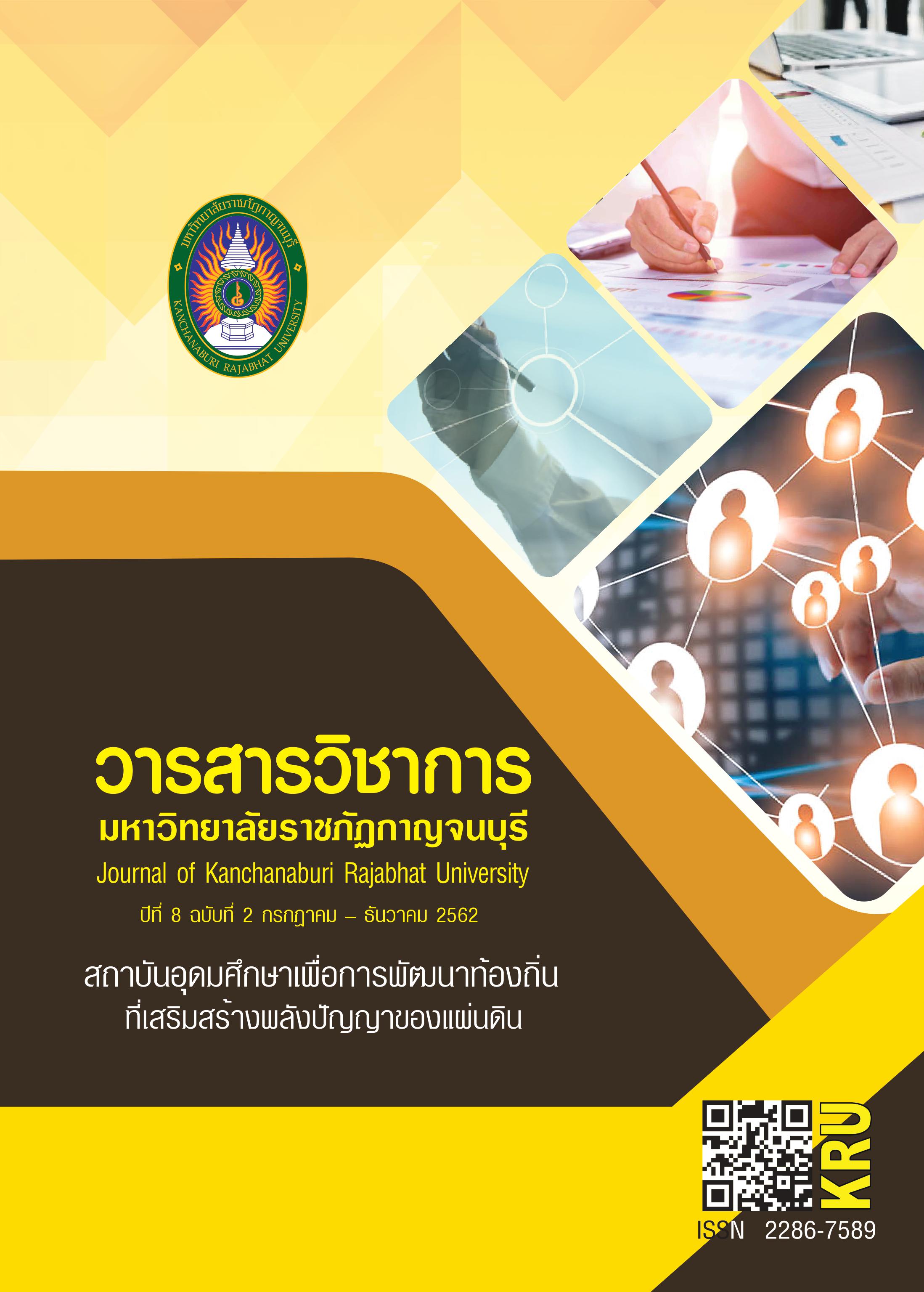STRATEGY FOR USING ONLINE MEDIA ETHICALLY FOR LOWER SECONDARY STUDENTS
Main Article Content
Abstract
Due to the widespread use of online media in the online media era, which online media is more violent than before, causing the effect of both physically and mentally suffered victims of online media use, which affects both directly and indirectly to people in society and families. It is well accepted that online media problems occur along with social change. Currently, the problem of using online media in the wrong way is extremely affecting the lives of people in society, whether eating, walking, sitting and sleeping, etc., these contexts will cause unexpected problems. Therefore, it is desirable to have an ethical online education for lower secondary students. In order to educate children and youth in using online media correctly, so that children and youth in society can use the online media with quality for the benefit of education, search for information and news efficiently. Therefore, the objectives of this study were: 1) to study the problem of using online media of the students studying at the lower secondary school level, 2) to develop strategies for using online media ethically for students studying at the lower secondary school level, 3) to develop training package for using online media ethically for the students studying at the lower secondary school level, 4) to compare knowledge achievement before and after training using training packages using online media ethically for the students studying at lower secondary school level, 5) to measure the ethic of the students in using online media ethically. The research included 5 steps according to the objectives. The group of informers who provide basic information in analyzing the problems of using online media and developing strategies for using online media, involved in the use of online media for the students studying at the lower secondary school level, as followed: school directors, computer teachers, parents, and supervisors. Data collecting were done by answering the questionnaires and organizing the focus group. The samples used in the research derived by purposive sampling were 23 lower secondary school students, grade 1, room 1, from Huaysai Prachasan School, academic year 2018.
Research results revealed that the problems of using online media of the lower secondary school students were: that the students lacked good ethic in online media, that the students lacked proper knowledge in online media and, that the students spent a lot of time using online media, making them not interested in learning as much as possible. Developing strategy of using online media ethically for the students studying at the lower secondary school level, consisted of 4 strategies: 1) raising awareness and understanding about online media, 2) developing knowledge about online media, 3) developing skills for using online media creatively and 4) building immunity in using online media. Creating training package for strategy of using online media ethically for the students studying at the lower secondary school level, the 4 strategies included a guide for lecturers and a guide for participants. There are 4 topics in each program: 1) what to know about online media, 2) benefits and penalties for online media, 3) creative online media use, and 4) disaster and disaster prevention In using online media. The target group who attended the training with training package on strategy of using online media ethically for the students studying at the lower secondary school level, had an average score of knowledge after receiving training more than before training. The trainees had to follow the ethic of using online media in 4 areas: 1) information privacy, 2) information accuracy, 3) information property, and 4) data accessibility, at a high level.
The main findings from this research were the strategy of using online media ethically for the students studying at the lower secondary school level, consisting of 4 steps: 1) raising awareness and understanding about online media, 2) developing knowledge about online media 3) developing skills in using online media creatively 4) building immunity in using online media and the measurement of ethic in the use of online media in 4 areas, information privacy, information accuracy, information property, and data accessibility.
Article Details
References
จักรพงศ์ เปรมจิตต์. (2554). จริยธรรมการใช้งานอินเตอร์เน็ตของกลุ่มนักเรียนมัธยมศึกษา โรงเรียนสวนกุหลาบ
วิทยาลัยรังสิต. การค้นคว้าอิสระ ปริญญาบริหารธุรกิจมหาบัณฑิต วิชาเอกระบบสารสนเทศ
คณะบริหารธุรกิจ มหาวิทยาลัยเทคโนโลยีราชมงคลธัญบุรี.
จิรพล ระวังการ. (2555). การพัฒนาชุดฝึกอบรมแบบผสมผสาน เรื่อง การบริการของอาสาสมัครองค์การพิพิธภัณฑ์ วิทยาศาสตร์แห่งชาติ. วิทยานิพนธ์ปริญญาศึกษาศาสตรมหาบัณฑิต สาขาวิชาเทคโนโลยีและสื่อสาร
การศึกษา มหาวิทยาลัยเทคโนโลยีราชมงคลธัญบุรี.
เจตน์สฤษฎิ์ สังขพันธ์ และคณะ. (2555). ผลกระทบการใช้โปรแกรมการสนทนาออนไลน์ในการดำเนินชีวิต
ของนักศึกษามหาวิทยาลัยสงขลานครินทร์. บทความวิจัย เสนอในการประชุมหาดใหญ่วิชาการ ครั้งที่ 4
เรื่อง “การวิจัยเพื่อพัฒนา สังคมไทย. 168 - 178.
ชัยยงค์ พรหมวงศ์. (2556). การทดสอบประสิทธิภาพสื่อหรือชุดการสอน. วารสารศิลปากรศึกษาศาสตร์ วิจัย, 5 (1), 7-20.
นันทวัฒน์ ภัทรกรนันท์. (2555). การพัฒนาชุดฝึกอบรมโดยใช้กระบวนการเรียนรู้จากประสบการณ์เพื่อเสริมสร้าง
จิตสาธารณะสำหรับอาสายุวกาชาด. ปริญญานิพนธ์ปริญญาดุษฎีบัณฑิต สาขาการศึกษาผู้ใหญ่
มหาวิทยาลัยศรีนครินทรวิโรฒ.
บุบผา เมฆศรีทองคำ และดนุลดา จามจุรี. (2554). การศึกษาการรู้เท่าทันสื่อ: วิถีทางในการสร้างพลังการรู้เท่าทันสื่อ. วารสารนักบริหาร, 31(2) : 63-69.
วิไลภรณ์ จิรวัฒนเศรษฐ์. (2559). เด็กยุคดิจิทัลภายใต้สังคมแห่งสื่อออนไลน์และการเรียนรู้ทางสังคม. JOURNAL
OF EDUCATIONFUTUROLOGY. 1(1): 1-10.
สถาบันสุขภาพเด็กและวัยรุ่นราชนครินทร์. (2558). จิตเวชศิริราช DMS 5. ภาควิชาจิตเวชศาสตร์คณะแพทยศาสตร์
ศิริราชพยาบาล มหาวิทยาลัยมหิดล. กรุงเทพฯ: มหาวิทยาลัยมหิดล.
สรัลชนา พึ่งฉิม. (2554). การศึกษาจริยธรรมในการใช้คอมพิวเตอร์และเทคโนโลยีสารสนเทศของนักศึกษาระดับ ประกาศนียบัตรวิชาชีพชั้นสูง (ปวส.) วิทยาลัยอาชีวศึกษาขอนแก่น. วิทยานิพนธ์ปริญญาครุศาสตร์ อุตสาหกรรมมหาบัณฑิต สาขาวิชาคอมพิวเตอร์และเทคโนโลยีสารสนเทศ.
มหาวิทยาลัยเทคโนโลยีพระจอมเกล้าธนบุรี.
สำนักงานส่งเสริมสังคมแห่งการเรียนรู้และคุณภาพเยาวชน (สสค.). (2556). 1 วันในชีวิตเด็กไทย. ค้นเมื่อ มิถุนายน 3, 2561,
จาก https://www.thaihealth.or.th/Content/16380-ผลสำรวจ%201%20วันในชีวิตเด็กไทย.html.
ศันสนีย์ สังสรรค์อนันต์. (2559). การพัฒนาชุดฝึกอบรม เรื่อง สื่อสังคมออนไลน์เพื่อการเรียนการสอนสำหรับ พนักงานครูในสังกัดเทศบาลนครสวรรค์. สาขาวิชาศึกษาศาสตร์ มหาวิทยาลัยสุโขทัยธรรมาธิราช.
อาชิรญาน์สุทัศน์ และ ธีรพล เป็กเยียน. (2558). การใช้สังคมออนไลน์ที่มีผลต่อนักศึกษา ปริญญาตรี. วารสารวิชาการ,
(18), 9-13.
อุลิชษา ครุฑะเสน. (2556). แนวทางการพัฒนากระบวนการเรียนรู้เท่าทันสื่อของแกนนำเยาวชน. วารสารวิชาการ Veridian E-Journal, 6 (3), 276-285.
Griffiths, M. (1996). Computer game playing in children and adolescents. London: National Children Bureau.
Meek, Elija Bruce. (1972). Learning Package Versus Conventional Method of International.
Disordered Children, 33 (2), 4295 – A.
Tobin, J. (1998). An American Otaku. in J. Sefiton-Green (ed.), Digital Diversions: Youth Culture in
the age of multimedia. London: UCL Press.
Young, K. S. (1998). Internet addiction: the emergence of a new clinical disorder. CyberPsychology &
Behavior, 1(1), 237-244.
Vivas, David A. (1985, September). The Design And Evalution of a Course in “Thinking Operations” for
First Graders in Venezuela. Dissertation Abstracts International, 46 (3), 603–A.
Wilson, Cynthia Louise. (1996, Auguse). An Analysis of a Direct Instruction Program in Teaching Word Problem-Solving to Learning Disabled Students. issertation Abstracts Internation,
(2), 416.


